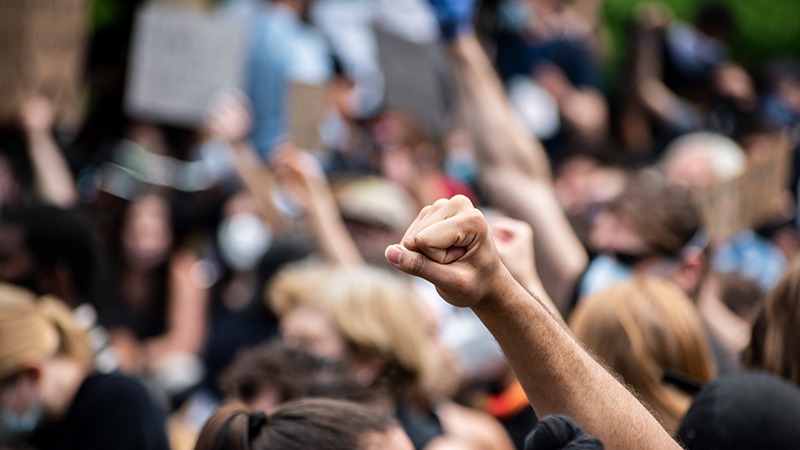The protests that began with the police murder of George Floyd have grown into an international uprising, as protests continue in all 50 U.S. states. Tens of thousands, if not hundreds, have been taking to the streets every day in multiple demonstrations. The protests have also consolidated a demand: they’re calling to defund the police.
Every night, thousands of protesters in cities across the United States have broken curfew and squared off with the police. They’ve remained in the streets even after initial demands for the arrest and disciplining of killer cops were met. Meanwhile, both Democratic and Republican politicians have feigned horror and grief over Floyd’s murder, yet they have tried to rein in the protests both rhetorically and with force.
While Trump hides out in his bunker, thumps the Bible for photo-ops, and threatens to deploy the military on protesters, the Democratic Party has continued using the carrot and the stick to control and subdue the protests.
In addition to giving some paltry concessions, like charging violent officers, the Democrats, both at the state and federal level, have proposed “defunding” measures and police reforms, most of which are already in place. Along with these concessions, mayors and governors, most of them Democrats, have deployed the National Guard and unleashed massive police violence on protesters. They’ve used kettling, have gassed, maced, used force on protesters, and have conducted mass arrests. Over 11,000 people have been arrested so far, over 12 have died, and dozens more have been severely injured.
From Repression to Co-optation
To some degree, the Democrats are also finding a way to place themselves at the head of the movement, one that has largely been made possible by a lack of coordinated leadership and the lack of rank-and-file democracy.
Although defunding the police has emerged as a central demand, it remains ambiguous. In Los Angeles, defunding has taken the form of redistributing less than a tenth of the LAPD’s budget, or up to $150 million, to services and organizations for Black and Brown communities. Similarly, in New York City the demand is to defund the NYPD by $1 billion, which is only a sixth of its operating budget. The Minneapolis City Council recently voted on a resolution to disband the MPD, but any real decision-making on this issue has been deferred by a year.
The emergence of this demand has given the movement political direction, but the lack of specificity or centralization of demands decided on through rank-and-file organization has made these demands open to interpretation. This vacuum has allowed Democratic Party leaders to step in with proposals for tepid reforms and attempts to co-opt the movement. While some leaders, like Mayor Bill De Blasio, are openly rejected, other, more “progressive” local leaders have been calling and leading gatherings, siphoning off all the energy in the streets into campaigns for elections that are months away.
It’s Time for Democratic Assemblies
As the protests continue, it is clear that the masses are becoming more radical in their demands and tactics. Protests that started in pockets of the United States have grown exponentially and coalesced around the call to defund the police. In Seattle, protesters have taken over city blocks, setting up barricades and food and medic stations.
As we see in demonstrations across the country, however, protesters attend a rally at a predetermined time and place, only to realize that Democrats, their related organizations, or other public figures are in control of the stage and the megaphone. The thousands who attend these protests don’t have the opportunity to give their opinion about what is being said, nor do they have a chance to decide where to march.
If protesters are to prevent the movement from being co-opted and repressed by opportunist leaders, and if they are to sustain the movement and chart a path forward politically, they need clear, democratic organizations. While in some cities, like Detroit and Seattle, assemblies and citywide meetings have begun to spring up, these meetings need to be expanded to play a central role in organizing the protests. To sustain and broaden the movement, to formulate demands, to establish and coordinate tasks, mass assemblies will be an important step forward.
Assemblies are a means for the rank-and-file masses to discuss issues, ranging from political orientation to demands, slogans and tactics, and make collective decisions. Assemblies are meant not only to develop a clear political analysis of the current situation, but also to coordinate actions and campaigns, both in the short and long term.
Assemblies provide a platform where all who are willing to speak and participate are heard and valued equally. No single person, group, or political organization can take over the process. Instead of having the Democratic Party machinery running the stage with their predetermined list of demands, they have to place their ideas alongside those of others. As a result, assemblies will come up with their own agenda, and the masses will have a chance to endorse or reject other proposals as opposed to feeling duty-bound to take them up. While assemblies aren’t automatically democratic, resolutive, combative, and anticapitalist, they have the potential to become so — and often do — because of the interventions of socialists and activists who push for radical demands and expose the traps of reformists. In examples from around the world, furthermore, assemblies have also organized study sessions that provide necessary background and depth of understanding to the current context.
Most importantly, assemblies give the rank-and-file masses direct experience in democratic organization. By deliberating over ideas and programmatic goals, in free, open debates with different political tendencies, a large slate of ideas will be presented from which a common political experience will start growing. Assemblies will be resolutive as each proposal is brought to a vote and everyone gathered is able to cast a vote. The masses will be able to draw concrete lessons as each decision is a product of a collective process through debate, vote, and action. Delegates and committees elected through this process will be immediately held accountable and can be recalled at any moment if they cannot perform, giving the masses critical experience in direct democracy. The representatives of each assembly, furthermore (territorial, workplaces, schools and universities), will be part of higher bodies that will coordinate them and give a broader mass to the movement.
Right now, assemblies are emerging as a form of organization among the rank and file in major epicenters of the uprising. In Minneapolis, the masses forced the mayor, Jacob Frey, to come out during such a gathering and consequently boo him away when he refused to commit to abolishing the police. Through assemblies, the masses in Minneapolis have also coordinated their political goals and actions. Such a process is also underway in Seattle, where, through debate, discussion, and coordination, protesters took over city blocks in the Capitol Hill neighborhood and set up an autonomous zone. On Tuesday evening, through coordinated action, they also took over City Hall, demanding the resignation of Mayor Jenny Durkan. They have also released a list of demands that not only demand the abolition of police, but also address economic and social inequity.
Assemblies, especially the ones that are organized territorially, will have the urgency to coordinate with other assemblies from different neighborhoods and cities to extend their influence and capacity of action. Most crucially, they will have the challenge to develop and connect with workplaces. Any self-organization body will find its own limits if it can’t mobilize the working class to fight against the ruling class with its strategic position within capitalism. Assemblies in workplaces are crucial in organizing workers for confrontation with the capitalist class.
As the Black Lives Matter movement now grows not only in size, but also in scope, it is no secret that the state, through its political representatives or its armed apparatus will try its best to fight back. Sites of protest or autonomous, recovered zones like those in Seattle will be at the receiving end of the state’s reaction. It is essential that the rank-and-file masses organize, both politically and tactically, not only to meet the needs of the current movement but also to fight for more.
There is no way to compartmentalize the fight against the police from the fight against capitalism. The police — defenders of private property — protect the interests of the capitalist state that uses racism to divide, oppress, and kill Black and Brown people. Assemblies will give the masses a means to organize their defense against the racist police, thugs, intelligence agencies, boycotts, and other repressive forces of the state. Such organization within workplaces, especially, can put a wrench in the capitalist wheel of production and attack the ruling class where it hurts the most.
These assemblies will have to become the center of organization of the many sectors that are fighting and organizing, to launch a coordinated struggle against such a state apparatus, and taking the fight, most crucially, to the heart of capitalist production. The development of the first step toward assemblies that can potentially become bodies of self-organization rooted in the working class will be crucial in fighting this racist, capitalist system.












